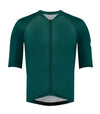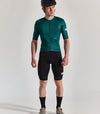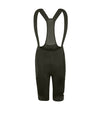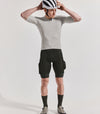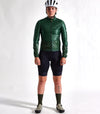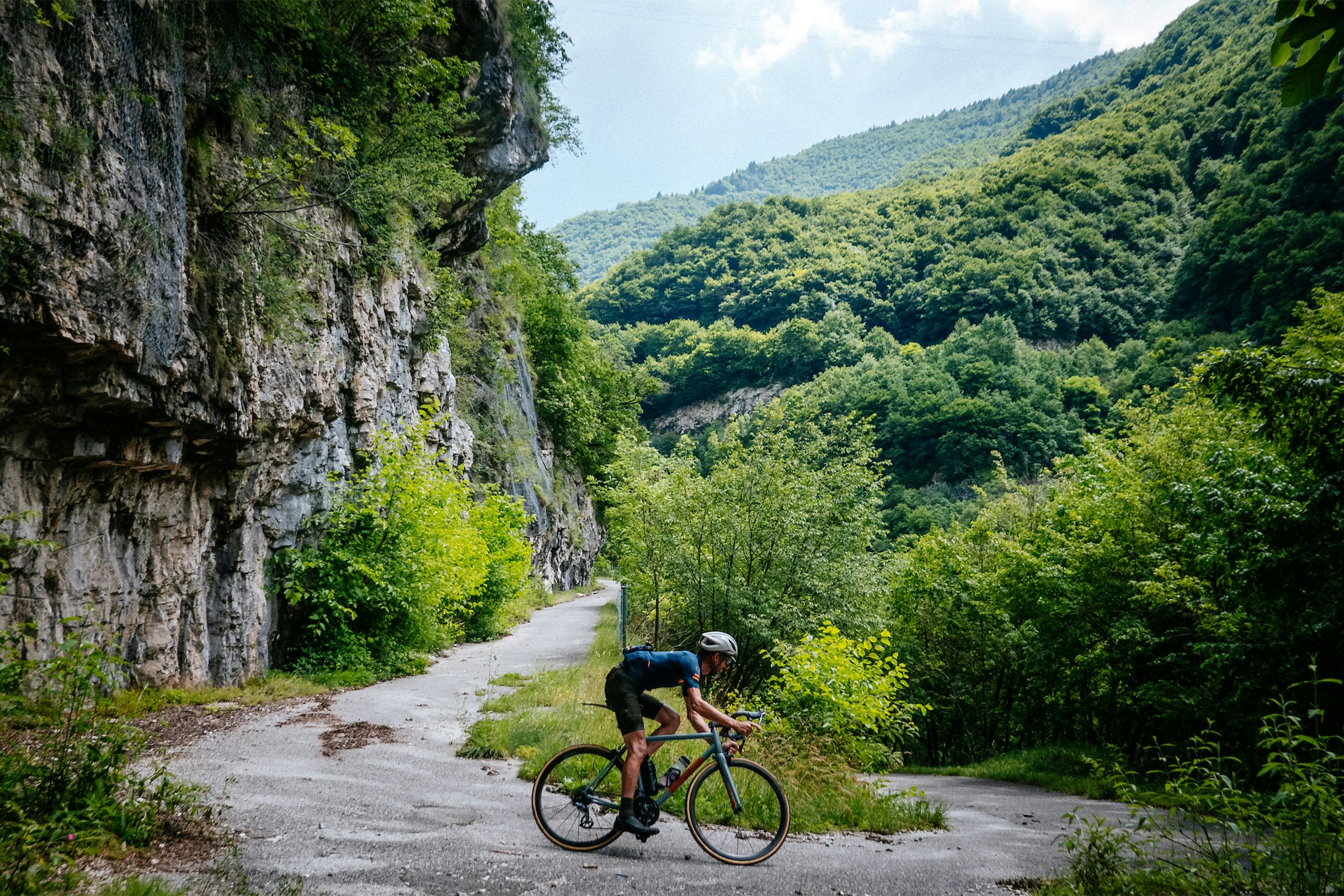
Cent Cols: Traverse 66
23-06-26Words by Phil Deeker, photos by Jered Gruber
Last week Phil Deeker completed the first 10 stages, or Chapter One, of his Traverse 66.
He's already begun Chapter Two, and on the 28th September he plans to arrive in Santiago de Compostela having ridden 66 stages, in Ten Chapters, over hundreds of cols, as his final tribute to years of riding in the mountains of Italy, France and Spain.
We spoke to Phil about his Traverse project, how his approach to riding has evolved, and the kit that keeps him going on long days in the mountains.
What is the Traverse 66?
Starting in the Friuli region of North East Italy and ending in the region of Galicia, North West Spain, it’s a 60-stage journey taking in roads that I either love or that I have wished to include in a Cent Cols event and never could until now. After designing circular routes for 16 years in each of the regions traversed here, I have designed a linear one this time.
This has given me creative freedom in the overall design, since I was not bound to find the magic 100 number of cols over the ten stages of each chapter. The six chapters ( four of which are Cent Cols events) are bookended by three prologue and three epilogue stages, making up the 66 in total ( I turn 66 in August this year).
I don’t see this as a ‘Challenge’. It’s a ‘Tribute’. To the Mountains themselves and to the years I have spent organising events to share their Magic.
You started riding Cent Cols events in 2007, and have ridden many thousands of kilometres, and climbed many thousands of metres, since then. How has your approach to riding these types of rides changed?
Both as a rider and as the organiser, my evolution within these two roles has been quite similar.
Feelings of : a) trepidation, b) pure intense passion of a ‘frontier-country’ state of mind as each adventure took me to new places, in every sense, and c) a volatile mix of naivety and an appetite for an adrenaline-fuelled adventure.
These were gradually replaced by a) a tranquil confidence, b) a deeper, clearer dialogue with my surroundings, and c) a kind of wisdom that has shown me how to point fellow riders towards the real “Why?”.
I no longer ride for the adrenaline of the Challenge. I ride in the hope of sharing moments both with the riders and with the mountains. Moments that will provide us with a better perspective for looking at ourselves and our world.
I used to always talk to clients about “Being in the moment”, not asking oneself how much further to the top. But now I find that I can place that present moment in its full context amongst the multiple horizons in front of me, and live it just as fully. Why am I not talking about the ‘technical’ side of my riding? Because on these rides, 90% of every aspect of the difficulty involved is in the mind. Your physical fitness is what you qualify yourself with for the event. It’s not what gets you through it. Every endurance athlete will tell you this, of course!
I now ride with a sense of gratitude and respect. It’s the “flow” of my ride that matters most to me. My thorough and careful preparation of the off-bike part of the rides is also something that I have mastered, I think. It has taken years!
How has cycling clothing changed in that time?
Excellent question, even if perhaps a little loaded?! Of course jerseys, base layers and bib shorts now perform better in so many ways, but the real change has come in the way new technology can equip us for the huge swings in temperature that are an inevitable part of riding in the mountains. Cent Cols events are supported, but vehicles may not be close to the riders when suddenly the weather turns. Riders will then be totally dependent on what they have on them to battle against the wet and cold.
I would summarise the change with three key words: Packability. Breathability. Flexibility. A piece of kit that ticks these boxes can be a total game-changer up there above 2000m altitude.
I could add to that Quick-drying, since we usually wash our kit (in the shower) nightly. To find a thick pure merino wool jersey still slightly damp the next morning is not the best way to start another 12 hours out there!
What advice would you have for someone who wants to ride further, and higher, but might look at something like a Cent Cols and think that the cumulative distances and amount of climbing seem intimidatingly hard?
Looking at the numbers is where the whole experience begins. The realisation of what those numbers mean is where the false notion of the “Impossible” starts! The thrill of doing it belongs to he/she who dares, who is excited about the prospect of going somewhere they have never been. We are back in the Mind region. But it does all have to start here. Others have done it, so you can too!
Then comes that fitness I referred to earlier, with which you can only then realistically ask your body to follow your crazy mind! Many, many hours in the saddle, building core strength, knee resistance, crocodile skin around your sit bones.
Nothing can replace those hours in the saddle, which makes it hard for many to combine with other more pressing things that their lives require of them. But for those who can fit this time in, even for just a year, the payback is HUGE! I exaggerate not by saying that many people have found a Cent Cols event to be life-changing.
We've seen the emergence of gravel riding, adventure racing and mixed-terrain riding in recent years. Your rides have always been (mostly!) on the road. What is it about road riding for you that is so special?
Another question I am so glad you asked! Because it’s not so much the mountains I love, but The Roads that take us over them. It’s the variety of road-buzz, the change of riding style to adapt to these surface changes. ( Yes, sometimes even the ruff-stuff finds its place on a CCC. Well, no one can complain if I take them up the Colle delle Finestre, surely?!) It’s the actual design of the road. How have the road-builders figured out a nice way to get up there? It’s the history they possess. How have they stood up to the test of time and weather? It’s the races that have been here, for well over 100 years. Here, on this tarmac inches below me. Many roads have genuine aura. I feel that so intensely sometimes. Do you need more?!!! ( Of course, I ride almost exclusively on roads with very little traffic. That does need to be said, I think for obvious reasons!)
When you look back on all the rides, the countless hours pushing the pedals, the ups and downs, what do you feel?
Hmmm, interesting. Above all, gratitude. To my body, first and foremost. To my wife, Claire, who has somehow accepted all of this, and is still beside me here on the Traverse 66 road.
I have really only explored the High Roads of France, Italy, and Spain. I am not really an Adventure Traveller. I was attracted by the sheer beauty of the scenery and light in the mountains, and the thrills of my new-found passion for the bike at 40 years young. I then discovered something quite unexpected. Mountain Magic + Active Meditation ( riding my bike) = The Peace Within. I know some will say I’m being pretentious when they read this. So be it. I’m just answering your question.
You've said before that Mt Ventoux is your favourite climb (or mountain, with its multiple routes up and down). Tell us about three amazing climbs that are off the beaten track, that people might not have heard of, but that should be on people's bucket lists?
The Mont Ventoux is a unique place. It’s not part of a mountain range. It’s a minimalist place that has given me such a diverse range of experiences.
I am not sure how much off the beaten track I need to go, but I’ll take you to three places that still give me goosebumps, just to think about.
Col d’Arnosteguy starts in the pilgrim town of St Jean Pied-de-Port in the French Basque Country, and this 16km climb is almost a secret I find hard to share! This area is my #1 area for riding my bike in, and it’s where the T66 final three stages will be held.
Port de Pailheres is the eastern way in and out of the Pyrenees. A Grand Tour climb, so not such a secret, both sides provide epic experiences. The final section of the eastern side includes my favourite natural arena I have yet to ride through.
Col de Solude via Villard Notre Dame. I chose this because it’s right opposite one of the few “cols” I usually avoid riding if I can : the Alpe d’Huez. A balcony road climb starting from Bourg d’Oisans, going through four pitch black rugged tunnels, ending up on a bit of non-road, totally rideable, of course! The whole ride is a gift.
Each of these have what I consider essential to the making of a great climb : they have to draw you away, progressively, from whence you came, via changing sections of vegetation and gorgeous views, keeping you busy with changing road-gradient, to a place you had not expected to be. Simple as that!
What is the best descent you've ever ridden?
I used to be a fast descender, I was told. Probably quite irresponsible, given the risks I was taking as the event organiser, although I thought I was always in control! My adrenaline-seeking speed-rides are over now! However, in their place, I have found an even better way to enjoy descents. When seeking speed, of course braking is kept to a minimum. This means that the line you take is what it’s all about. I now realise that in fact even if you use your brakes more, you can still enjoy creating that line, so long as you focus on The Flow. Any descent should not be a stop-go thing, into and out of hairpins. When you get the feeling that you are riding WITH the road, it’s amazing.
Which is why I still put the Hautacam as my #1 descent, as long as it’s either early or late in the day to avoid traffic. It’s a climb known to be hard for its ever changing gradients. This is exactly why I love coming back down so much. I’m useless as a dancer on my own two feet, but on this descent I feel like I’m truly dancing with the road on my two wheels. Swooping and swinging sideways, upwards, downwards, sharply, gently, intimately in the tighter turns, loosely as the gradient even tilts up briefly. It’s a non-stop buzz that has made me smile as I ride for years! It's such a busy descent, fun ride down. But like any fast descent, it requires your 101% focus!
Why does Albion clothing work for you, for the style of riding you are doing in the mountains?
Above all, it’s their packability, as explained above. To carry kit that makes you feel secure but uncluttered is a real treat. But it’s also your clever accessories that are often game-changers : the Burner, the Lightweight back-pack, the side and back pockets on the bibs, to name a few.
Favourite bit of Albion kit?
I can't choose just one, but luckily I've found a way to cheat and I'm going for the "Confidence Combo", or "Comfort Combo".It's a set of three items which I have had with me on the first 10 stages of theTraverse 66) and which has taken away so much worry about how threatening that sky is looking when I am still Up High.
After a clammy hot day of riding, each stage ended with a chase against the rain, as thunder roared down on our backs.
With the new Pertex Endurance DWR lightweight backpack (launching later this summer by Albion) containing the Ultralight Insulated Jacket and the All Road Pertex Shield Rain Jacket, I have faced cold descents and torrential downpours with a smile on my face. With just these three items of kit, it's surprising how much stress can be taken out of the ride.
The new laser cut holes under the arms of the Ultralight Insulated Jacket jacket really work for both taking the flapping out on a fast descent and making it more breathable when working hard on the way up, when it's been cool enough to need something more than a jersey. It's basic stuff, but, it would seem, so hard to get right, since I've been looking for this perfect combo for years!!
Traverse 66 is your 'final' Cent Cols event. What will life look like after Cent Cols for you?
I have so many plans. Not so many of them on the bike. But Claire, my wife, knows that I’m not close to hanging up my wheels yet. There’s enough to get through this year first though. I’ll wait and see what lies over the horizon, when there! I’ve always loved doing that.
You can follow Phil's Traverse 66 journey via a diary that he is writing, here: https://www.centcolschallenge.com/thejourney
For more information about the stages of the Traverse 66, head to https://www.centcolschallenge.com/traverse
